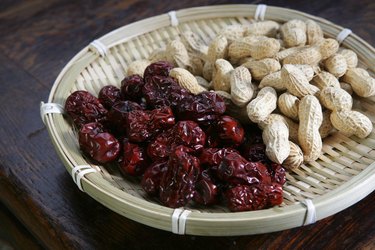
Salicylates, amines and glutamates naturally occur in many of the foods you eat on a daily basis. Some people are sensitive to these chemicals and can experience hives, swellings, stomach and bowel irritation, as well as headaches. If you have this kind of intolerance, it is likely that you are also sensitive to additives that are often found in processed foods. Consult with your doctor to be accurately diagnosed with your food intolerance and meet with a registered dietitian that specializes in this area to establish a meal plan that is suitable for you.
Vegetables
Video of the Day
Your best vegetable options for a diet free of salicylates, amines and glutamates are potato, lettuce, green beans, cabbage, celery, carrot, cucumber, asparagus, pumpkin, peeled zucchini and sweet potato. You should avoid avocado, bell pepper, eggplant, onion, mushroom, spinach and all tomato-based foods.
Video of the Day
Fruits
Most fruits contain high levels of salicylate and amine, including berries, grapes, dried fruits, kiwi, pineapple, ripe bananas and apple, peach and nectarine peels. Lower your exposure and stick with peeled pears and apples, or barely ripe bananas. You should also limit your fruit intake to no more than two servings a day.
Protein
Choose fresh, unprocessed meats such as beef, veal, lamb, chicken, fish and eggs. Remove the skin of chicken because it is high in amines and avoid aged meat because of its high salicylate, amine and glutamate content. You should also avoid sausage, bacon, ham, gravy, stocks, meat pies, canned fish and breaded fish.
Nuts and Seeds
Almost all nuts and seeds, including almonds, peanuts and sunflower seeds, are very high in salicylates and amines. You should also avoid the butter made from these nuts. Your only options are cashews and poppy seeds, and these should only be consumed in very small amounts to avoid exceeding your food chemical threshold.
Fats and Oils
Many oils are rich in salicylates and amines, including avocado, olive, sesame, coconut and peanut oils, as well as most commercial mayonnaises and salad dressings. Stick to alternatives with a very low food chemical content, such as butter or ghee, if you tolerate dairy products; and canola, safflower and sunflower oils. You can make your own salad dressings and mayonnaise using safe fats and oils.